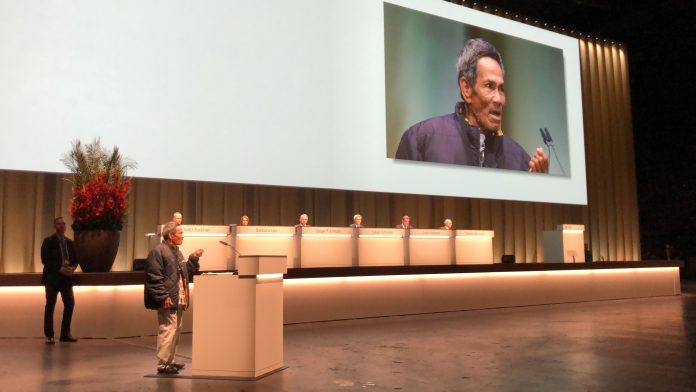A fisherman from Batangas, south of Manila urged European financial institutions to stop investing in fossil fuel projects that harm marine life and local communities.
Maximo Bayubay, a 68-year-old fisherman, addressed the annual general meeting of Switzerland-based bank UBS Group in Basel on April 24.
Bayubay, making his first trip abroad, conveyed the environmental challenges his community faces due to unsustainable practices linked to fossil fuel dependency.
As vice president of the Bukluran ng Mangingisda sa Batangas (BMB), he reported a significant drop in fish catches, directly questioning the audience: “What will we promise the future generations if we continue financing this kind of peril?”
He discussed the ecological effects on the Verde Island Passage (VIP), an important marine biodiversity area threatened by infrastructure projects for imported liquefied natural gas. These developments, he noted, pose a threat to the biodiversity of the region.
In his speech, Bayubay criticized investments in fossil fuel projects, especially UBS’s ties with San Miguel Corporation (SMC) and its subsidiary, Excellent Energy Resources, Inc. (EERI), which are involved in a new liquefied natural gas power plant in Batangas City that impacts the VIP.
“We are suffering now and you are continuing funding, financing fossil gas. It’s a big question for me. Why?” he said.
Bayubay also promoted alternative energy sources like solar, hydro, and wind power. He pointed out the potential for renewable energy in the Philippines, estimated at 1,211 GW, and called for a shift towards these cleaner options.
The fisherman emphasized the moral responsibilities of financial institutions, stressing the need to rethink investment strategies that prioritize profits over sustainable growth and ecological well-being.
As Bayubay prepares to share the responses from his plea with his community, his efforts highlight the global impact of environmental stewardship and the significant influence of financial decisions on distant communities.









